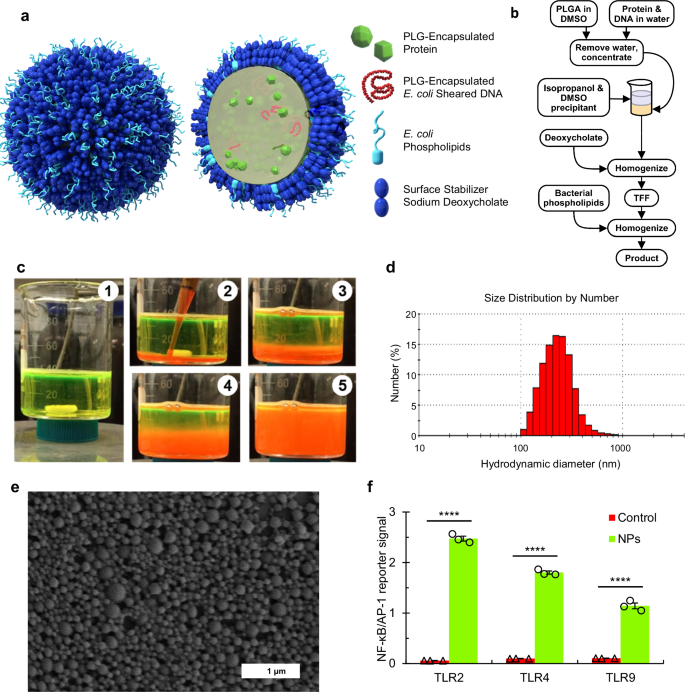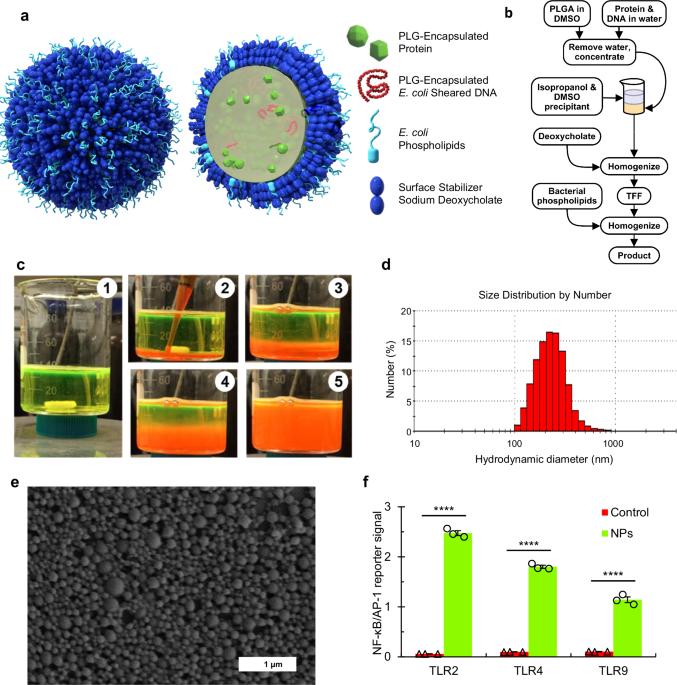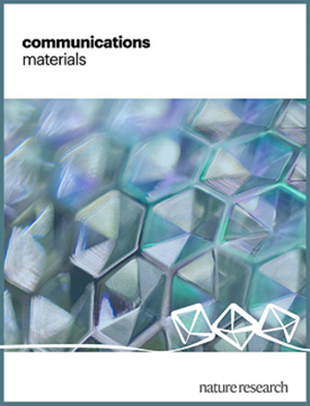用于免疫调节的高负载蛋白质纳米颗粒的规模化生产
IF 7.5
Q1 MATERIALS SCIENCE, MULTIDISCIPLINARY
引用次数: 0
摘要
免疫调节和脱敏是一个不断发展的研究和临床调查领域,需要将抗原精确传递到免疫系统细胞。纳米粒子(NPs)已成为抗原递送的绝佳候选材料,特别是在免疫脱敏应用中。NP 包裹的蛋白质抗原能将蛋白质和共包裹的佐剂传递给抗原呈递细胞,而不会引起全身暴露和过敏反应。在这里,我们展示了一种通过高效、高产和大规模非均相沉淀工艺生产聚乳酸-共聚乙二醇(PLG)NPs 的方法。该工艺能生产出成分复杂、含有蛋白质的 PLG NPs,同时还能在 NP 载体中加入 DNA 和大肠杆菌磷脂作为整体佐剂。口服 PLG NP 能激活小鼠的免疫系统,在从花生过敏症患者体内分离出的嗜碱性粒细胞中,封装的花生过敏原蛋白引起的嗜碱性粒细胞激活水平比未封装的蛋白低约 10 倍。这些有效性和安全性证据使 PLG NPs 成为临床应用的绝佳候选药物。本文章由计算机程序翻译,如有差异,请以英文原文为准。


Scaleable production of highly loaded protein nanoparticles for immune modulation
Immune modulation and desensitization is a growing field of research and clinical investigation that requires precise delivery of antigens to immune system cells. Nanoparticles (NPs) have emerged as excellent candidates for antigen delivery, particularly in immune desensitization applications. NP-encapsulated protein antigens enable the delivery of protein and co-encapsulated adjuvant to antigen-presenting cells without systemic exposure and allergic response. Here, we show a method for producing poly(lactide-co-glycolide) (PLG) NPs in an efficient, high-yield, and large-scale inhomogeneous precipitation process. The process enables the production of compositionally complex PLG NPs containing protein while also incorporating DNA and E. coli phospholipids as integral adjuvants in the NP vehicle. Orally delivered PLG NPs activate the murine immune system, and encapsulated peanut allergen protein elicits approximately 10-fold lower levels of basophil activation than does unencapsulated protein in basophils isolated from peanut-allergic patients. This efficacy and safety evidence makes these PLG NPs excellent candidates for clinical applications. Protein-loaded nanoparticles are important for immunomodulatory applications. Here, an efficient method for producing protein-containing nanoparticles at large scale is developed which overcomes prior limitations on the use of poly(lactide-co-glycolide) nanoparticles.
求助全文
通过发布文献求助,成功后即可免费获取论文全文。
去求助
来源期刊

Communications Materials
MATERIALS SCIENCE, MULTIDISCIPLINARY-
CiteScore
12.10
自引率
1.30%
发文量
85
审稿时长
17 weeks
期刊介绍:
Communications Materials, a selective open access journal within Nature Portfolio, is dedicated to publishing top-tier research, reviews, and commentary across all facets of materials science. The journal showcases significant advancements in specialized research areas, encompassing both fundamental and applied studies. Serving as an open access option for materials sciences, Communications Materials applies less stringent criteria for impact and significance compared to Nature-branded journals, including Nature Communications.
 求助内容:
求助内容: 应助结果提醒方式:
应助结果提醒方式:


